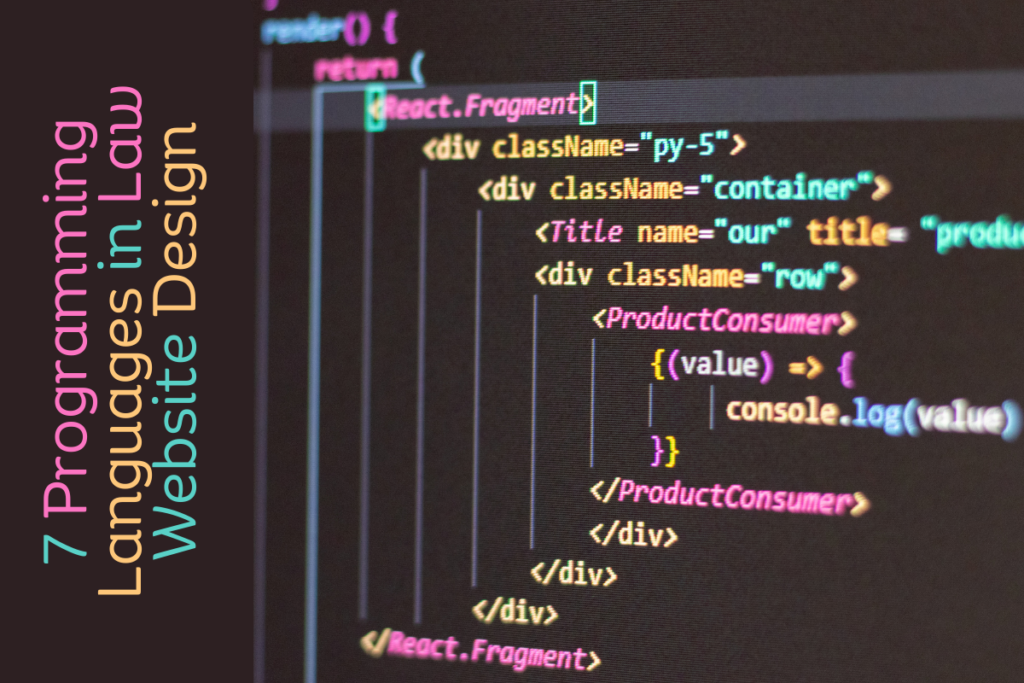For businesses online with their own website, web design involves similar programming languages as general web design. However, due to the unique needs of your customers, such as data privacy, ease of use, and accessibility, particular attention is given to certain aspects of these programming languages.
1. HTML
HTML (HyperText Markup Language) is the cornerstone of any web design project. For businesses online, creating a clear, easy-to-navigate site structure is essential, allowing users to find crucial information like services, contact details, and attorney profiles. HTML allows for this content structuring.
2. CSS
CSS (Cascading Style Sheets) determines how a website looks. For legal professionals, the design should evoke trust and professionalism. CSS can create a visually appealing layout with a consistent color scheme, typography, and spacing. CSS also allows for a responsive design, ensuring the website looks great on all devices, which is essential given the increasing use of mobile browsing.
3. JavaScript
JavaScript plays an extremely crucial role in enhancing the user experience. From dynamic elements like drop-down menus and contact forms to more complex features like real-time chat support, JavaScript adds interactivity to a legal website. Given the often urgent nature of legal inquiries, features like chatbots (implemented via JavaScript) can provide instant responses, significantly improving user experience.
4. PHP
PHP is a server-side scripting language oftentimes used in web development in Las Vegas. It’s essential for websites that require dynamic elements, like a blog, news section, or any feature that pulls information from a database. Many content management systems used for website creation, like WordPress, are PHP-based, allowing for easy updates and management of content.
5. Python
Python is another server-side language gaining popularity in web development in Las Vegas. It’s used for more complex tasks like data analysis and machine learning. For businesses online, Python could create intelligent intake forms, predict outcomes based on historical data, or develop custom CRM (customer relationship management) systems.
6. Ruby
Ruby, with the Ruby on Rails framework, is another efficient tool for developing web applications. While not necessarily used directly in front-end design, it provides robust back-end support. It can help build complex, database-driven sites, automate tasks, manage user sessions, and more.
7. SQL
SQL (Structured Query Language) is utilized to communicate with databases. For online businesses with a large amount of client data or legal precedents, SQL can manage, query, and manipulate this data.
Finally, given the sensitive nature of data handled by businesses online, a solid knowledge of security principles and secure coding practices is essential. Languages like Python and PHP, used for server-side processing, must be implemented with a focus on secure coding to prevent data breaches and ensure client confidentiality.
Conclusion
In conclusion, HTML, CSS, and JavaScript form the trio that shapes the front end of a website. PHP, Python, or Ruby are typically used for the back-end operations, while SQL is employed to interact with databases. Each of these programming languages is crucial in designing a professional, user-friendly, and secure website for businesses online.
If you need help with your online business’s website design, please get in touch with Drive Traffic Media. We are a digital marketing firm in Southern California with years of experience in the industry. If you need to boost your online presence, Drive Traffic Media is here at (949) 800-6990 or (310) 341-3939.
